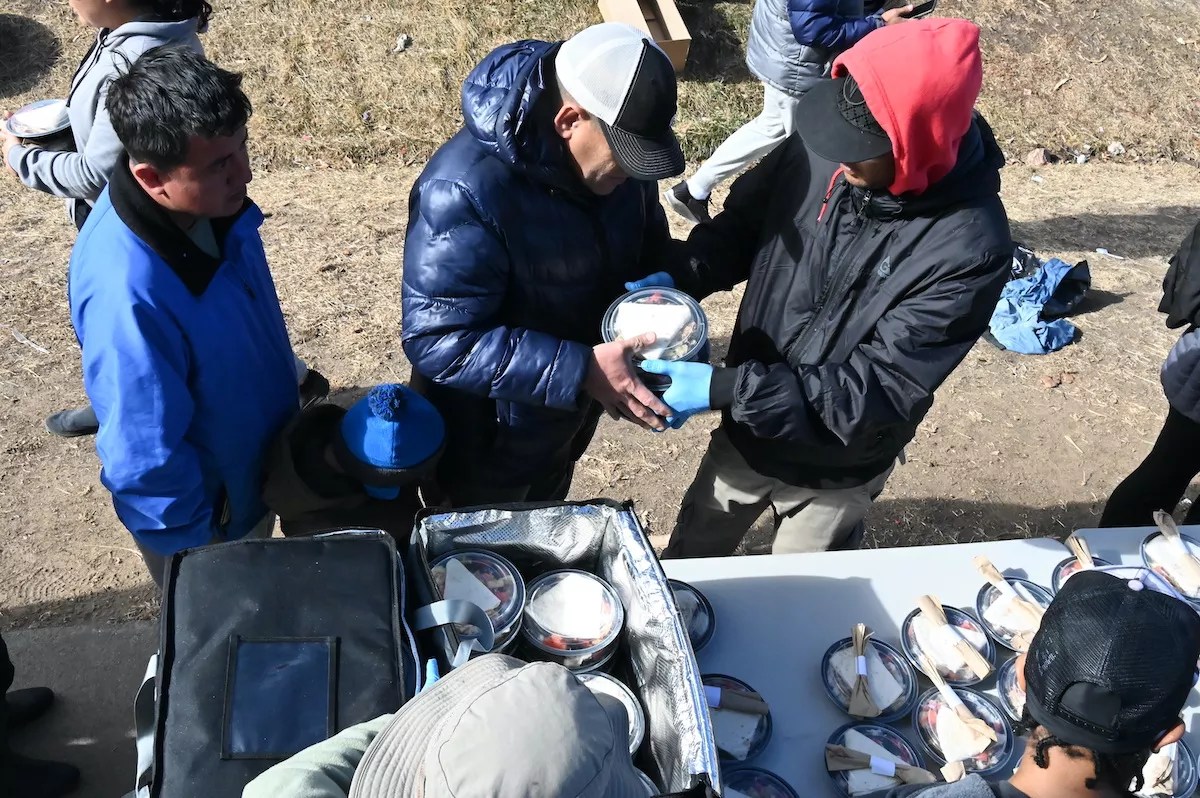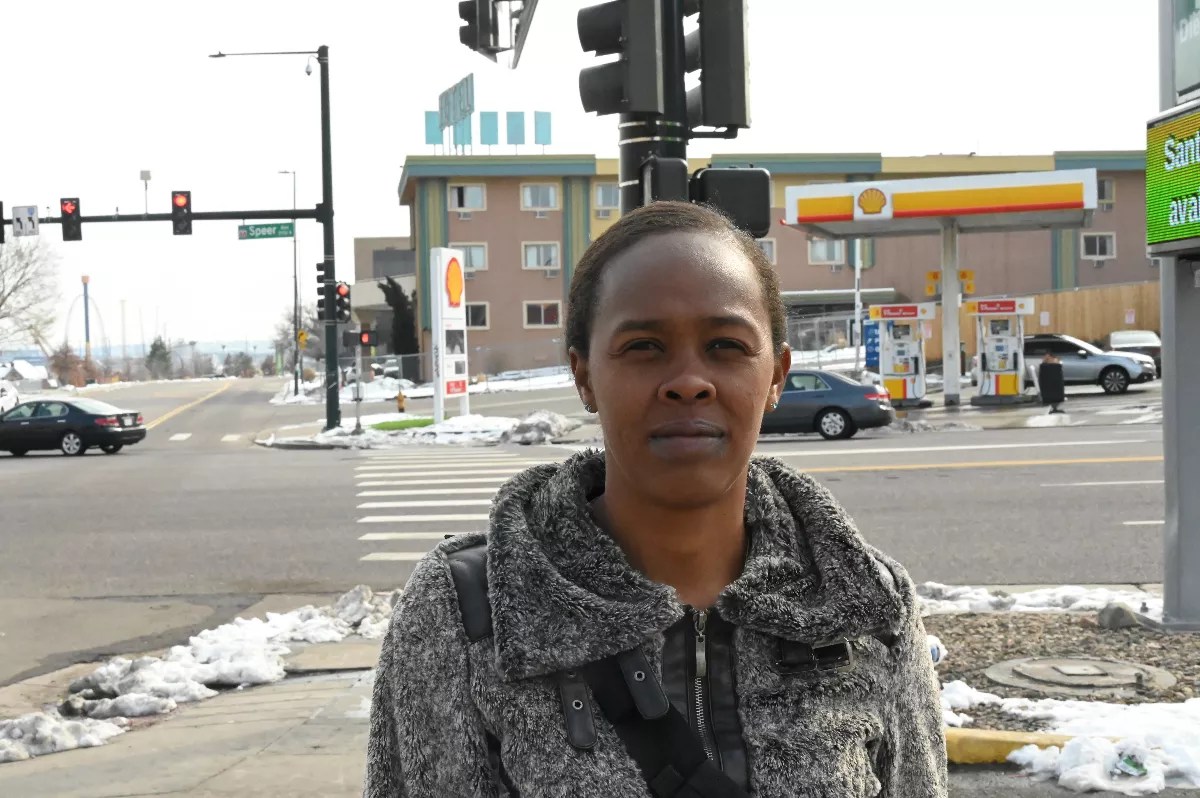
Bennito L. Kelty

Audio By Carbonatix
Update: On the evening of Monday, March 18, Denver City Council voted to approve the $20 million increase in migrant hotel room funding.
By Friday, March 22, Noemi Pacheco and her twelve-year-old daughter have to leave the Quality Inn shelter at 2601 Zuni Street. But despite the pending departure, the Venezuelan migrant says she “can’t complain.”
“I can’t complain about what they offer to someone here,” Pacheco says. “I feel fine because, despite everything, we came here and they supported us. They didn’t throw us out onto the streets, and I feel grateful for that.”
More than 1,150 migrants like Pacheco are staying in Denver’s city-run migrant shelters as of today, March 18. And later today, Denver City Council will consider how much more funding to set aside for migrants while city departments try to cut back on other services to save money.
The main provider of shelter hotel rooms for the City of Denver is Quebec Hospitality LLC, which operates as Colorado Hospitality Services and owns hotels across the Denver area. The city paid Colorado Hospitality Services about $16 million for hotel rooms for migrants in 2023.
In February, the council unanimously approved a six-month, $25-million contract with Colorado Hospitality Services for housing for migrants until July. Today councilmembers will consider adding another $20 million to that six-month contract “to add needed capacity” for migrant sheltering, according to the purchase order request, making the total contract amount $45 million from February through July.
The transaction being considered tonight does not require the city to pay $20 million if the hotel rooms are not used. According to the contract amendment, the funding will provide the flexibility to continue purchasing rooms if they are needed between now and July.
Colorado Hospitality Services operates local franchises of big-name budget hotels like Quality Inn, Comfort Inn, Microtel, Stay Inn and Radisson; the contract with the city also pays Colorado Hospitality Services for laundry and front desk hotel services.
The number of available hotel rooms for migrants depends on how many are staying in Denver at any time, according to Denver Human Services spokesperson Jon Ewing, but the city is currently narrowing down its inventory to 2,000 hotel rooms open for migrants.
“Everything we do is based on occupancy,” Ewing says. “We can’t predict when the next influx of people will come – and already arrivals are ticking back up. We’ve closed two shelters already and expect to close two more shelters in the coming weeks. At the end of the day, the three hotel shelters we’ll have left will have a combined total available occupancy of around 2,000 guests. The goal is obviously to stay well beneath that number, but it’s important to always be prepared.”
The city is in the process of closing four shelters to cut back and consolidate costs for migrant services. The move is part of Mayor Mike Johnston’s strategy for carving into the estimated $180 million it would cost to continue supporting migrants for the rest of 2024 at January’s pace, when nearly 5,000 migrants were staying in city shelters.

Venezuelan migrant Noemi Pacheco has no complaints about the service she has received at the Quality Inn migrant shelter at 2601 Zuni Street. “I feel grateful,” she says.
Bennito L. Kelty
Two migrant shelters have been closed so far, including a hotly debated site in Aurora. On March 14, a shelter located near Denver International Airport on East 63rd Avenue was closed. Two more shelters on Tower Road will close by the end of the month, according to the city.
Johnston has said the city is saving $60 million in migrant service costs by closing these shelters, bringing the expected 2024 total cost of serving migrants to $120 million.
The $120 million projection is currently being refined, according to Denver finance department spokesperson Laura Swartz, with an updated figure expected in April. However, the $45 million contract considered today in council is included in Johnston’s $120 million estimate, she notes, as it was based on all expenses the city might incur this year, including shelter, food, staffing, bus tickets and more.
The city intends to shelter most migrants at three consolidated locations. Two other migrant shelters are on standby, and the other remaining shelter is the Mullen Home, a family shelter.
To avoid displacing migrants, the city has been phasing them out by not admitting any more at closing shelters while continuing to discharge migrants at the end of their length-of-stay periods, which is 42 days for families and fourteen days for individuals.
Since December 2022, about 40,000 migrants have arrived in Denver and either stayed at the shelters or continued onward to a different town or city. Johnston estimates about 60 percent of migrants in Denver stay, while 40 percent travel elsewhere. Ewing says it’s about fifty-fifty.
Meanwhile, on Wednesday, March 20, the Denver City Council Safety & Housing committee will consider re-upping contracts to feed migrants staying at the city’s shelters. One contract would give Colorado Hospitality Services $500,000 to feed migrants at shelters citywide for the next ninety days; another would pay Michaels of Denver Catering $350,000 for the same service.
Denver City Council originally approved a $100,000 contract for migrant meals with Colorado Hospitality Services in December. It renewed the contract for January with $375,000, then again in February to the tune of $450,000. If the new contract passes on Wednesday, Denver will have paid Colorado Hospitality Services $1.4 million since December to feed migrants. The city paid Michaels of Denver Catering $1 million in 2023 to provide additional meals.
Adults in migrant shelters get two free meals a day: breakfast and dinner. Each breakfast costs the city about $7 a meal while dinner is closer to $10. Kids’ meals cost the city $3, and children are served lunch, as well. Shelters also offer snacks like trail mix, granola bars, string cheese, crackers and fruit. Water bottles and cans of soda are also available.
“The truth is, they’ve helped us,” Pacheco says. “The food is the way it is, but the truth is, it’s helped.”